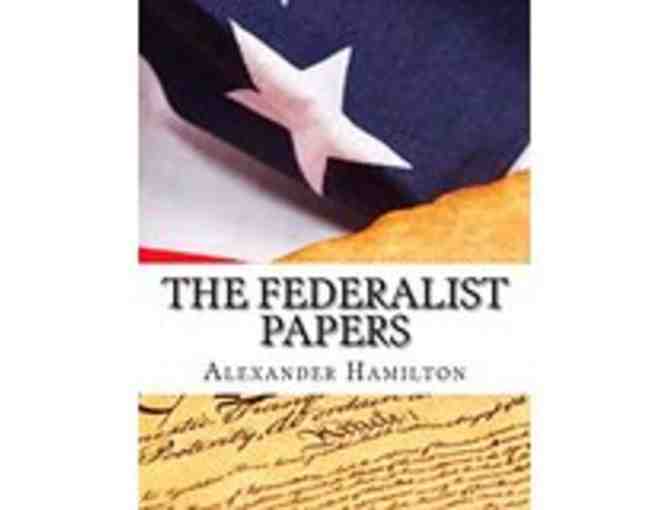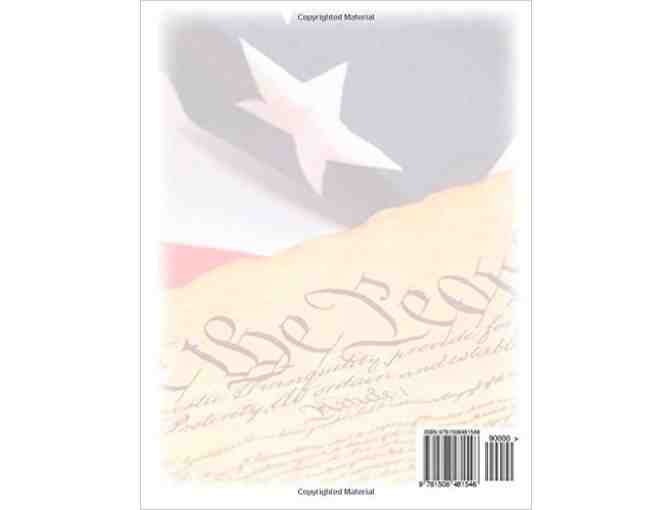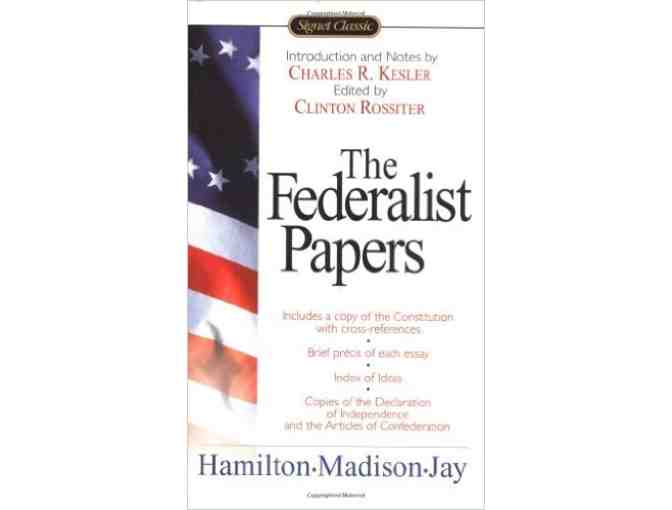"The Federalist Papers" by Alexander Hamilton! For a Special Gift! Personally Autographed

Item Number: 127
Time Left: CLOSED


Description
Janine Turner will personally autograph to you and mail to winning bidder!
Measures 7 1/2" x 9 7/8"!
Originally published anonymously, The Federalist Papers first appeared in 1787 as a series of letters to New York newspapers exhorting voters to ratify the proposed Constitution of the United States. Still hotly debated, and open to often controversial interpretations, the arguments first presented here by three of America’s greatest patriots and political theorists were created during a critical moment in our nation’s history, providing readers with a running ideological commentary on the crucial issues facing democracy.
Today The Federalist Papers are as important and vital a rallying cry for freedom as ever!
"The Federalist (later known as The Federalist Papers) is a collection of 85 articles and essays written by Alexander Hamilton, James Madison, and John Jay promoting the ratification of the United States Constitution. Seventy-seven were published serially in The Independent Journal and The New York Packet between October 1787 and August 1788. A compilation of these and eight others, called The Federalist; or, The New Constitution, was published in two volumes in 1788 by J. and A. McLean. The collection's original title was The Federalist; the title The Federalist Papers did not emerge until the 20th century. Though the authors of The Federalist Papers foremost wished to influence the vote in favor of ratifying the Constitution, in Federalist No. 1 they explicitly set that debate in broader political terms: It has been frequently remarked, that it seems to have been reserved to the people of this country, by their conduct and example, to decide the important question, whether societies of men are really capable or not, of establishing good government from reflection and choice, or whether they are forever destined to depend, for their political constitutions, on accident and force. There are many highlights among the essays of The Federalist. Federalist No. 10, in which Madison discusses the means of preventing rule by majority faction and advocates a large, commercial republic, is generally regarded as the most important of the 85 articles from a philosophical perspective; it is complemented by Federalist No. 14, in which Madison takes the measure of the United States, declares it appropriate for an extended republic, and concludes with a memorable defense of the constitutional and political creativity of the Federal Convention. In Federalist No. 84, Hamilton makes the case that there is no need to amend the Constitution by adding a Bill of Rights, insisting that the various provisions in the proposed Constitution protecting liberty amount to a "bill of rights". Federalist No. 78, also written by Hamilton, lays the groundwork for the doctrine of judicial review by federal courts of federal legislation or executive acts. Federalist No. 70 presents Hamilton's case for a one-man chief executive. In Federalist No. 39, Madison presents the clearest exposition of what has come to be called "Federalism". In Federalist No. 51, Madison distills arguments for checks and balances in an essay often quoted for its justification of government as "the greatest of all reflections on human nature."The Federalist (later known as The Federalist Papers) is a collection of 85 articles and essays written by Alexander Hamilton, James Madison, and John Jay promoting the ratification of the United States Constitution. Seventy-seven were published serially in The Independent Journal and The New York Packet between October 1787 and August 1788. A compilation of these and eight others, called The Federalist; or, The New Constitution, was published in two volumes in 1788 by J. and A. McLean. The collection's original title was The Federalist; the title The Federalist Papers did not emerge until the 20th century. Though the authors of The Federalist Papers foremost wished to influence the vote in favor of ratifying the Constitution, in Federalist No. 1 they explicitly set that debate in broader political terms: It has been frequently remarked, that it seems to have been reserved to the people of this country, by their conduct and example, to decide the important question, whether societies of men are really capable or not, of establishing good government from reflection and choice, or whether they are forever destined to depend, for their political constitutions, on accident and force. There are many highlights among the essays of The Federalist. Federalist No. 10, in which Madison discusses the means of preventing rule by majority faction and advocates a large, commercial republic, is generally regarded as the most important of the 85 articles from a philosophical perspective; it is complemented by Federalist No. 14, in which Madison takes the measure of the United States, declares it appropriate for an extended republic, and concludes with a memorable defense of the constitutional and political creativity of the Federal Convention. In Federalist No. 84, Hamilton makes the case that there is no need to amend the Constitution by adding a Bill of Rights, insisting that the various provisions in the proposed Constitution protecting liberty amount to a "bill of rights". Federalist No. 78, also written by Hamilton, lays the groundwork for the doctrine of judicial review by federal courts of federal legislation or executive acts. Federalist No. 70 presents Hamilton's case for a one-man chief executive. In Federalist No. 39, Madison presents the clearest exposition of what has come to be called "Federalism". In Federalist No. 51, Madison distills arguments for checks and balances in an essay often quoted for its justification of government as "the greatest of all reflections on human nature."
"Anyone who wants to define who Americans should be should read THE FEDERALIST PAPERS. They should also read THE ANTI-FEDERALIST PAPERS and read clear, informed, and well written political theory from men who could actually think. Most political hacks and too many American citizens are not even vaguely aware of this important political writing. Yet, this political writing is the very best American political thinking in U.S. History. This reviewer highly recommends the Rossiter-Kesler edition of THE FEDERALIST PAPERS and other editions of THE ANTI-FEDERALIST PAPERS."
"The Mentor edition (used by Scalia among others) is by far the best edition of the Federalist Papers. It includes substantial amounts of related information, but of primary importance is the entire text of the Constitution with cross references to specific pages of the Federalist Papers on that topic. This is an extremely useful tool to anyone desiring to gain more knowledge about the Constitution and the founders intent, and it is especially useful to anyone taking a Con Law class.
In general the Federalist Papers is a must read for anyone interested in the founding of the US, or desiring to learn how our system of federalism, and separation of powers was intended to work. I recommend reading numbers 10, 49, and 78 first."